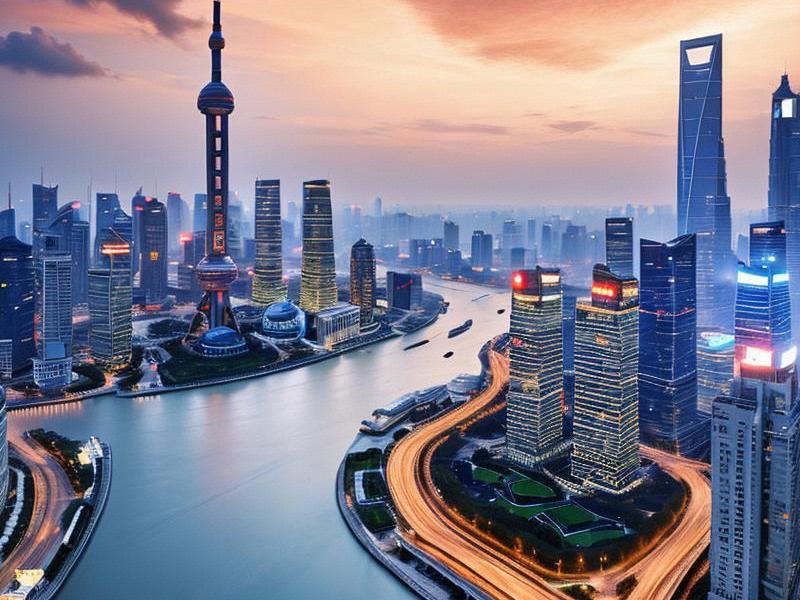
Shanghai, the bustling metropolis on the banks of the Huangpu River, has long been a symbol of China's economic prowess. In recent years, however, this city has been making waves in a different arena: innovation. As the world grapples with rapid technological changes, Shanghai has emerged as a beacon of progress, leveraging its strategic location, robust infrastructure, and forward-thinking policies to become a global innovation hub.
The journey towards becoming an innovation powerhouse began several decades ago when Shanghai started to focus on economic restructuring and modernization. The city government invested heavily in education, research, and development, laying the groundwork for a knowledge-based economy. This strategic pivot was not just about economic growth but also about fostering a culture of innovation that would sustain Shanghai's competitiveness in the global arena.
One of the key factors behind Shanghai's success is its commitment to technological advancement. The city has become a hub for high-tech industries, particularly in areas such as artificial intelligence (AI), biotechnology, and information technology. Shanghai's Zhangjiang Hi-Tech Park, often referred to as China's "Silicon Valley," is home to numerous startups and established tech companies that are at the forefront of innovation. These companies are not only driving economic growth but also contributing to global technological advancements.
The city's government has played a pivotal role in fostering this environment. Through initiatives like the Shanghai Free-Trade Zone, the government has created a regulatory framework that encourages foreign investment and the exchange of ideas. This has attracted multinational corporations and international research institutions to set up operations in Shanghai, further enriching the city's innovation ecosystem.
上海龙凤阿拉后花园 Shanghai's focus on education and talent development has also been instrumental in its rise as an innovation hub. The city boasts world-class universities and research institutions that produce a steady stream of highly skilled graduates. These institutions collaborate with industry leaders to conduct cutting-edge research and develop innovative solutions to real-world problems. The ShanghaiTech University, established in 2014, is a prime example of the city's commitment to nurturing the next generation of innovators.
In addition to technological advancements, Shanghai's urban development strategies have also contributed to its status as an innovation hub. The city has embraced smart city technologies to enhance the quality of life for its residents and improve the efficiency of its infrastructure. Smart traffic management systems, energy-efficient buildings, and digital public services are just a few examples of how Shanghai is leveraging technology to crteeaa more sustainable and livable city.
The Bund, once a symbol of Shanghai's colonial past, has been transformed into a modern financial district that houses some of the world's leading banks and financial institutions. The Lujiazui Financial District, located across the river, is another testament to Shanghai's economic transformation. These areas are not only hubs of financial activity but also centers of innovation, where new ideas and technologies are constantly being developed and implemented.
Shanghai's cultural diversity has also played a role in its innovation journey. As a global city, Shanghai is home to people from all over the world, each bringing their unique perspectives and experiences. This cultural melting pot fosters creativity and collaboration, essential ingredients for innovation. The city's vibrant art scene, music festivals, and international exhibitions provide platforms for cross-cultural exchanges and the sharing of ideas.
上海龙凤419社区 However, Shanghai's rise as an innovation hub is not without challenges. The rapid pace of technological change requires continuous investment in research and development, as well as the upskilling of the workforce. The city must also navigate the complexities of intellectual property rights and data privacy in an increasingly interconnected world. Despite these challenges, Shanghai remains committed to its vision of becoming a global leader in innovation.
The Chinese government's support has been crucial in Shanghai's journey. National policies aimed at promoting innovation and entrepreneurship have provided a conducive environment for the city's growth. Initiatives like the Made in China 2025 strategy have further reinforced Shanghai's position as a hub for advanced manufacturing and high-tech industries.
Shanghai's success story is not just about the city itself but also about the broader implications for China and the world. As a global innovation hub, Shanghai is contributing to the development of new technologies and solutions that address some of the world's most pressing challenges, such as climate change, healthcare, and urbanization. The city's experiences offer valuable lessons for other cities aspiring to become centers of innovation.
419上海龙凤网 In conclusion, Shanghai's transformation into a global innovation hub is a testament to the power of strategic planning, investment in education and technology, and a commitment to creating an environment that fosters creativity and collaboration. As the city continues to evolve, it is poised to play an even more significant role in shaping the future of innovation and driving economic growth on a global scale.
The journey of Shanghai from a traditional port city to a global innovation hub is a story of resilience, adaptability, and vision. It is a story that highlights the potential of cities to drive progress and innovation in an increasingly complex and interconnected world. As Shanghai looks to the future, its focus on sustainability, inclusivity, and technological advancement will be key to maintaining its position as a leader in the global innovation landscape.
The rise of Shanghai as an innovation hub is not just a Chinese success story but a global one. It demonstrates how cities can leverage their unique strengths and resources to drive innovation and crteeaa better future for their residents and the world at large. As we look ahead, Shanghai's journey serves as an inspiration for other cities around the globe, showing that with the right strategies and commitment, the possibilities are endless.
